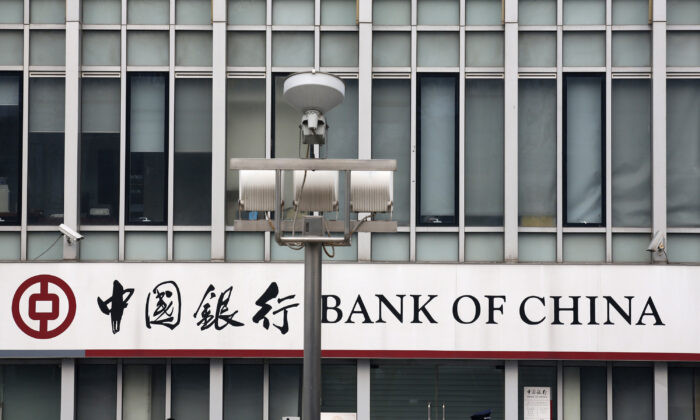BEIJING/SHANGHAI鈥擟hina’s largest state-owned banks are readied for rising bad debt and increased margin pressure in the months ahead as forbearance policies designed to give borrowers breathing space during the coronavirus crisis expire.
All five banks, which have been raising provisions to counter expected losses due to rising soured loans, have reported their biggest profit falls in at least a decade.
“The external challenges in the second half are unprecedented,” Bank of China Ltd (BOC) President Wang Jiang said on Aug. 31.
Their forecasts highlight the impact of the pandemic and the economic slowdown on China’s banks, which have been asked by Beijing to step up and lend to flagging sectors while sacrificing profits in a bid to revive the country’s fortunes.
Borrowers are struggling to repay debt after months of lockdown, and some sectors, such as those in the travel industry, are battling to survive under the shadow of the coronavirus.
Second-quarter loan-loss provisions were up 61 percent to 436 percent compared to the same period in 2019 at ICBC, CCB, AgBank, and BOC, data from China International Capital Corp (CICC) showed.
 A logo of the Agricultural Bank of China is seen at the SIBOS banking and financial conference in Toronto, Ontario, Canada, on Oct. 19, 2017. (Chris Helgren/Reuters)
A logo of the Agricultural Bank of China is seen at the SIBOS banking and financial conference in Toronto, Ontario, Canada, on Oct. 19, 2017. (Chris Helgren/Reuters)The crater in first-half profit was mostly down to provisioning ordered by regulators, CICC said, noting that second-quarter profit growth would otherwise have been 1.5 percent to 5.1 percent for those four lenders.
“As forbearance policies that help companies to recover expire in the first half of next year, the impact of non-performing loans will increase,” Chief Risk Officer Jin Yanmin of China Construction Bank Corp (CCB) said during a news briefing.
Agricultural Bank of China (AgBank) President Zhang Qingsong said bad loan pressure was rising, as short-term policies aimed to keep firms afloat expired, adding that its profit growth faces pressure from a “declining loan prime rate, fee cuts, and an increase in loan loss provisions.”
Ji Zhihong, CCB vice president, predicted that net interest margins, a key profitability indicator, will narrow further.
Industrial and Commercial Bank of China (ICBC), the world’s largest commercial lender by assets, will face higher pressure on loan risk controls in the second half and will increase efforts on provisions to guard against “significant turbulence,” ICBC Vice President Liao Lin said.
Overall, Chinese commercial banks recorded a 9.4 percent drop in first-half net profit to 1 trillion yuan, data from the China Banking and Insurance Regulatory Commission showed.
By the end of the June quarter, the average non-performing loan ratio for commercial banks was at 1.94 percent, data from the commission showed, the highest since 2009.
And banks are likely to keep boosting provisions in the third quarter, Everbright Securities analyst Wang Yifeng said.
 A customer waits at a counter of a branch of China Construction Bank Corp (CCB) at its headquarters in Beijing, China, on March 31, 2016. (Kim Kyung-Hoon/Reuters)
A customer waits at a counter of a branch of China Construction Bank Corp (CCB) at its headquarters in Beijing, China, on March 31, 2016. (Kim Kyung-Hoon/Reuters)However, CICC analysts said the first half is likely to mark the start of the sector’s bottoming-out and they expect the industry to post profit growth again in 2021 as economic activity gradually recovers.
‘Uncertain Impact’
Non-performing loan (NPL) ratios rose at the big five banks during the reporting period, with ICBC’s increasing to 1.5 percent by the end of June from 1.43 percent three months earlier, and that of CCB rising by 0.07 percentage points in the second quarter to 1.49 percent.
“Consumer behavior changes and reshuffle of industries accelerated by the pandemic will have an uncertain impact on the economy,” Moody’s Investor Service analyst Nicholas Zhu said.
 A man walks past an office of Bank of Communications in Beijing, China, on Aug. 27, 2020. (Thomas Peter/Reuters)
A man walks past an office of Bank of Communications in Beijing, China, on Aug. 27, 2020. (Thomas Peter/Reuters)In the second half and early 2021, big banks are expected to step up the sale of capital bonds to help counter deteriorating asset quality, Zhu said.
China’s biggest banks still have an estimated shortfall of $500 billion by 2025 to meet global capital requirements, Moody’s estimates.
Net interest margin鈥攁 key gauge of bank profitability鈥攆ell at ICBC, BoCom, CCB, and AgBank, although it improved slightly at BOC.
($1 = 6.8455 Chinese yuan renminbi)
Focus News: China’s Big Banks Face Fallout as Pandemic Forbearance Expires
